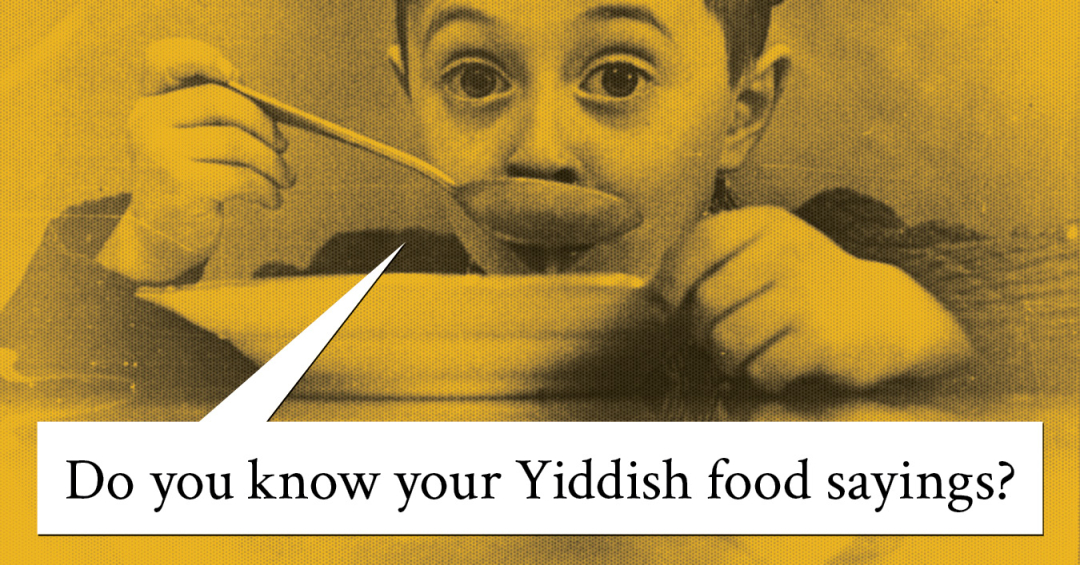
|
Check your answers below and let us know how you did on social media!

#yiddishquiz |
1. Mixing apples and oranges:
a) Tsunoyfmishn kashe mit botshvene. (Mixing kashe and beet-leaf soup.)
b) Tsu broyt gefint men shoyn a meser. (For bread you can always find a knife.)
c) A moltsayt on a tsimes iz vi a mayse on a moshl. (A meal without a sweet dish is like a story without a moral.)
d) A kneydl in a kholem iz nit keyn kneydl, nor a kholem. (A matzo ball in a dream, is not a matzo ball, just a dream.)
2. When pigs fly:
a) Di libe iz zis nor zi iz beser mit broyt. (Love is sweet but better with bread.)
b) Morgn nokhn kaltn kugl. (Tomorrow after the cold kugel.)
c) Beser gefilte fish eyder gefilte tsores. (Better gefilte fish than a full pack of trouble.)
d) Es nit di lokshn farn shabes. (Don’t eat the noodles before Shabbos.)
3. That's how it's done OR you've got it:
a) Fun broyt antloyft men nit. (You don’t run away from bread.)
b) Ot azoy kokht men di lokshn. (That’s how you cook the noodles.)
c) Vu men darf tsuker hobn, toyg nit keyn zalts. (When you need sugar, salt won’t do.)
d) A hun iz gut tsu esn zelbanand: ikh un di hun. (Chicken is good to eat in pairs: me and the chicken.)
4. Neither here nor there:
a) Kashe mit borsht. (Kashe with borsht – hodgepodge.)
b) Tam gan eydn. (Taste of heaven.)
c) A hering iz genug far tsen parshoyn, a hon koym far tsvey. (One herring is enough for ten, a chicken barely for two.)
d) Pareve lokshn. (Pareve noodles.)
5. The grass is greener on the other side:
a) Bays vayter – vestu gefinen kez. (Bite harder, you’ll find some cheese.)
b) Khreyn iz gut far di tseyn, oykh iz gut farn boykh. (Khreyn is good for your teeth, and also your stomach.)
c) Ersht fun dem dritn beygl vert men zat. (Only after the third bagel is one satisfied.)
d) Geshmak iz der fish af yenems tish. (The fish on the next table is tastier.)
6. In your dreams:
a) Men ken lekn di finger. (Finger-licking good.)
b) Hobn a kishke on a dno. (Having bottomless intestines – an insatiable appetite.)
c) Shabes nokhn kaltn kugl. (Shabbos after cold kugel.)
d) Alts ken der mentsh fargesn nor nit esn. (One can forget everything, but one never forgets to eat.)
7. Make lemonade out of lemons:
a) Bemokem she-eyn ish iz a hering oykh a fish. (Where there is no man, a herring is also a fish.)
b) Az der mogn iz leydik iz der moyekh oykh leydik. (When the stomach is empty so is the brain.)
c) Boser vedogim iz an oyneg shabes – in der vokhn iz es oykh nit shlekht. (Meat and fish are Shabbos delights – and not bad the rest of the week either.)
d) Af yenems simkhe hot men a gutn apetit. (One brings a good appetite to someone else's special occasion.)
8. Put all your eggs in one basket:
a) Makhn a lekhayim. (Make a toast.)
b) Araynton di gantse kez in eyn knish. (Put all the cheese in the knish.)
c) Broyt vert nit nimes. (Bread doesn’t get boring.)
d) Nit milkhik, nit flayshik. (Neither milk nor meat.)
9. Helped when you tried to hurt:
a) A hering badarf men keyn zalts un tsu grivn keyn shmalts. (Herring doesn’t need salt and grivenes don’t need shmaltz.)
b) Klept es vi an arbes tsum vant. (It sticks like peas on the wall.)
c) Ver es est lang kugl, derlebt lang. (Whoever eats kugel a long time, will live a long time.)
d) Er hot im darharget mit a knish. (Killed him with a knish.)
If you really want to take your knowledge of Jewish food to the next level, sign up for our newest online course, A Seat at the Table: A Journey into Jewish Food, FREE through December 31!
The course features hundreds of never-before-seen archival objects, lectures by leading scholars, and video demonstrations of your favorite Jewish recipes by renowned chefs. Register for the course now.
Enjoy this sneak peek into the course, in which Josh Russ Tupper leads us on a site visit to Russ & Daughters and gives a unique look at the history surrounding herring.




